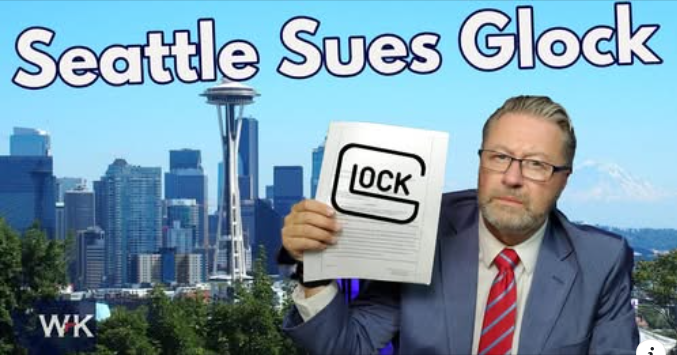
By Dave Workman
Editor-in-Chief
While the City of Seattle made big headlines this week by filing a lawsuit against Glock, Inc., and three area firearms retailers, trying to hold the company accountable for crimes committed by people using illegally-altered Glock pistols, a prominent Washington state gun rights attorney is suggesting the legal action will collide with the Protection of Lawful Commerce in Arms Act (PLCAA).
This federal law was signed by former President George W. Bush to put a stop to a series of “junk” lawsuits filed by liberal city mayors against gun manufacturers two decades ago in an effort to financially cripple the firearms industry.
The city is arguing in its 61-page complaint that Glock manufactures pistols which are easily and illegally altered by criminals using a device called the “Glock switch”—which the company does not manufacture nor promote—and therefore can be sued under the state’s [public nuisance statute.
Attorney William Kirk, president of Washington Gun Law, said in a podcast that unless the city can show Glock has been complicit in “actually promoting these illegal Glock switches” and have somehow aided in the distribution of the illegal devices, “This lawsuit is going absolutely nowhere.”
But making that happen will likely cost the taxpayers in Seattle, and Glock and it’s co-defendants, some money.
“What the City of Seattle is saying,” Kirk observed in his nearly 13-minute video, “is ‘because illegal people are doing illegal things with illegal items that are prohibited by law and they are attaching them to your perfectly legal item, you’re responsible for what’s going on out there.
“It is the illegal third party activity,” Kirk explained, “using an illegal device that Glock does not manufacture, does not promote, does not disseminate, does not distribute that leaves cause for the city to believe that they have a lawsuit against Glock.”
But PLCAA may bring that belief to a crashing halt. PLCAA is the statute used by the U.S. Supreme Court to unanimously derail Mexico’s lawsuit against the U.S. firearms industry earlier this year.
In the meantime, in his podcast, Kirk suggested there may be another motive at work, and he pointed to the second-place primary election finish of City Attorney Ann Davison as a possible catalyst for the legal action.
“The city attorney finished on the silver medal platform during the primary,” Kirk said, referring to her lackluster finish, “so this is likely a frivolous lawsuit designed to chum the waters, excite the base of voters and then she can go out there and claim that she is trying to do something to make the city safe.”
Kirk’s post on Facebook is already getting quite a bit of feedback from followers.
In an interview with KOMO news, the ABC affiliate in Seattle, Kirk observed, “There is not a single gun owner right now who will tell you right now that Glock Switches are legal in any way. Where does the problem lie? The problem lies with people installing these on firearms – that’s an illegal activity.”
Kirk also noted, “I wonder if Seattle truly does have an escalating gun problem; how much of that was from their decision to de-police the community? How’s that worked out for the city so far?”
The city moved to reduce funding for the police department during the 2020 “Summer of Love” which saw considerable unrest and violent protest in the wake of the George Floyd incident in Minneapolis.
It is the continuing violent crime and reduced manpower which may be at least partly responsible for the continuing rise in the number of active concealed pistol licenses (CPL) in the state, and especially in King County, which encompasses Seattle.
According to data obtained by TGM from the state Department of Licensing, during August the number of active CPLs went up only slightly, from 713,195 at the end of July to 713,295 at the end of August. Every one of those additional CPL probably were added in King County, which closed July with 114,508 active licenses to 114,826 on Aug. 31, according to DOL data.
Virtually all of the cases used as examples of illegally-altered Glocks being retrieved by law enforcement involved juveniles, ranging in age from 13 to 20 years. Nobody in that age range can legally own, possess or carry a concealed handgun under Washington state statute.


